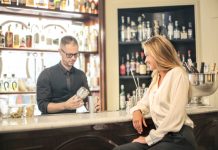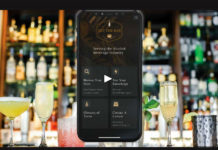State warns Bay Area Bars Not to Infuse Drinks
Demian Bulwa, San Francisco Chronicle
Cocktails are mixed with great sincerity at Bourbon and Branch in San Francisco. Take the Clermont Affair, a marriage of pear-infused Old Overholt whiskey, a liqueur called Amaro Nonino, barrel-aged bitters and a house-made tincture of cloves.
The $12 drink, the menu reveals, “tells the story of a flawed love.”
But for state liquor license regulators, the concoction itself is flawed. On a recent Friday night, they entered the speakeasy-themed Tenderloin tavern and warned bartenders they were breaking California law by altering alcohol – infusing it with the flavors of fruits, vegetables and spices.
 Mixing elaborate drinks – say, muddling mint leaves in mojitos – and serving them immediately is OK. But, the Department of Alcoholic Beverage Control agents said, Bourbon and Branch was changing the character of the booze by allowing it to mature on the shelf – “rectification” that is illegal without a special license.
Mixing elaborate drinks – say, muddling mint leaves in mojitos – and serving them immediately is OK. But, the Department of Alcoholic Beverage Control agents said, Bourbon and Branch was changing the character of the booze by allowing it to mature on the shelf – “rectification” that is illegal without a special license.
The agency, known as ABC, does not plan to cite the bar for the alleged transgression, nor three other Bay Area saloons where agents recently found homemade infusions while responding to unrelated complaints. Agency officials said stopping infusions is not a new – or high – priority.
Uproar ensues
Still, the incident caused a major stir in a region obsessed with all things culinary, where some barkeeps call themselves mixologists as they wield cucumbers, eggs and hot peppers.
In recent years, house-infused drinks – often made with local produce – have become as common in the Bay Area as fried calamari. Reza Esmaili, president of the Northern California chapter of the United States Bartenders Guild, estimated that half the bars in San Francisco serve them.
The state says it is trying to make sure consumers aren’t sickened by a drink and ensure they know what they’re swallowing. But many cocktail purveyors see a post-Prohibition law originally aimed at bad hooch rather than gourmet gimlets, with no modern purpose except ginning up fines.
The bartenders guild is preparing to fight it, as is John Hinman, one of San Francisco’s top liquor license attorneys. He said ABC is misreading the law and making a meaningless distinction between cocktails that sit for a few minutes and those that stew for hours.
‘Fantastic solvent’
Lance Winters agrees. The master distiller at St. George Spirits in Alameda said infusions using everyday food ingredients pose no special risk to customers at bars and restaurants. “Alcohol is a fantastic solvent,” Winters said.
“Not only is it biologically inert – nothing can survive in it – it also has a way of pulling all of the flavorful oils from the skin of whatever you’re working with.”
At Rickhouse, a Financial District watering hole that has the same owners as Bourbon and Branch and was also warned by the state about infusions, customers said they were perplexed by the law.
“I think it’s absurd. Most kitchens in restaurants are manufacturing food and mixing ingredients,” Chris McCarty, a 43-year-old bond salesman, said as he drank a pale ale with a friend.
McCarty, however, said the episode could have a positive effect if “some guys pull the umbrellas out of their drinks and order a bourbon on the rocks.”
Whither sangria?
Across the bar, 30-year-old saleswoman Monique Lapuyade joked that the warnings didn’t affect her – “I’m a straight wino.” But then her eyes widened with concern and she asked, “What about sangria?”
Chris Albrecht, who oversees ABC’s trade enforcement unit, said some sangria – which often includes fruit, wine and hard liquors such as brandy and gin – may be OK. But shelving it to let it mature may not.
Several bar owners, however, said Sangria has to sit for a while before it’s ready to serve.
Albrecht said bars could get in trouble for making infusions, but added, “People need to make their own decisions looking at the overall picture and the approach we’ve taken to this subject historically.”
 Bars surprised
Bars surprised
The warnings come almost two years after ABC issued an advisory saying agents had learned bars were “engaging in rectification” without a proper license.
But not a single Bay Area business was cited for rectification in 2008 or 2009, and many bar owners said they had never heard about the issue.
Now, they are trying to figure out what to do. Many are still serving infusions, hoping the ABC will pull back. Other establishments, such as Nova in South Beach, have gotten rid of infusions out of caution.
The drinks were a hot item at Nova, which used to be called Infusions. Until a few weeks ago, bartenders drowned jalapenos and pomegranates in vodka, storing the result in enormous jars with spigots.
At Farmer Brown, bar manager Harmony Fraga said she had scotched her oatmeal and honey vodka. “To have to censor yourself,” she said, “is unfortunate.”
Infusion happy hour
Other bars and restaurants said they were unaware of the controversy until they were contacted by The Chronicle, including Roe in San Francisco’s South of Market. On Thursday night, it hosted an
“Infused Vodka Happy Hour.” “That’s new to me,” said manager Steve Dong. “If it’s something ABC wants, we’ll have to take it off the menu.”
At Bourbon and Branch, where the owners declined to comment, the Clermont Affair remains on the menu. So does the Stan Lee Sour, which features gin infused with hibiscus and jasmine. But customers can’t order them.
Fitting with the bar’s theme, the cocktails are now stamped “Prohibited.”
Infusion confusion
Bars and restaurants can mix and muddle drinks and serve them right away to customers, according to the state Department of Alcoholic Beverage Control. But they cannot engage in “rectification,” which the agency defines as “any process or procedure whereby distilled spirits are cut, blended, mixed or infused with any ingredient which reacts with the constituents of the distilled spirits and changes the character and nature or standards of identity of the distilled spirits.”
Bay Area bartenders say infused spirits typically take a few hours to a few days to take on the flavor of the fruit, vegetable or herb that is placed in the alcohol. They said the law could affect not only infusions but house-made tinctures, bitters, syrups and liqueurs.
Click here for the article “State warns Bay Area bars not to infuse drinks” on the San Francisco Chronicle Online
(Photos: Top, Carlos Avila Gonzalez; Bottom, Kat Wade)








